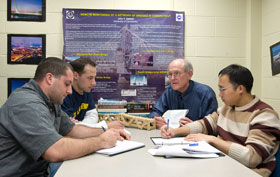  |
| HOME | THIS ISSUE | CALENDAR | GRANTS | BACK ISSUES | < BACK | NEXT > |
DeWolf encourages students to look beyond nuts and boltsby Sherry Fisher - February 12, 2007 | ||||
| John DeWolf wants his students to see the big picture. “Structural engineering requires great care, because the consequences of failure are often catastrophic,” says DeWolf, a professor of civil engineering with a specialty in structural engineering. “This means that design can be intimidating to students.” While it’s essential that engineering courses have a strong concentration on the nuts-and-bolts aspects, “that alone isn’t sufficient,” he says. “Students must gain an understanding of how structures behave.” That’s why one of DeWolf’s objectives in teaching is to “assure that discussion and assignments are focused as much as possible on the big picture. Looking at the overall structure is more exciting than focusing on the minute details, and if they can describe the overall behavior of the system, they can always readily relearn the nuts-and-bolts aspects on their own.” DeWolf, who joined the faculty in 1973, was named a University of Connecticut Teaching Fellow for 2006-07. He says one of his goals is to help students see how the design process can be exciting. “If I can help my students become enthusiastic about what they do, I can help them become engineers,” he says. He does this by using real examples of buildings, bridges, and other structures, encouraging students to explore why the engineer followed a particular path. “I encourage my students to explore how construction influenced actual design and to learn how to critically evaluate designs,” he says. Writing is a key element in DeWolf’s courses. He has students read articles about specific structures, write about them, and do “back-of-the-envelope” calculations. “These short written assignments offer students the opportunity to see a variety of real designs,” he says. He is a co-author of the textbook Mechanics of Materials, which is widely used in American colleges and universities. It has been translated into six languages. DeWolf, who earned his doctorate at Cornell, says that while students may not like writing, the skill serves them well in their careers. “Former students will often say they are surprised at how much they’re writing,” he says. “But engineers have to be able to describe things to non-engineers.” Gino Troiano, a second-semester graduate student in civil engineering, says what makes DeWolf a great professor and teacher is his passion for the material. “With experience as his student and his teaching assistant,” he says, “I have seen first-hand the time and effort he puts into preparation for each class – rereading notes, finding related articles to bring to class, and relating the material to real-world applications.”
DeWolf’s research includes stability studies of columns, beams, and frames; studies of the torsion behavior of beams; and development of design guidelines on structural connections. For the past two decades, his research has focused on different techniques for monitoring highway bridges. Anizka Garcia, a senior majoring in civil engineering, says DeWolf “is the type of teacher that any serious student, with a real desire to learn, wants to have. He emphasizes the important points, is reasonable, and knows his subject. He has a true understanding of how structures work, which allows him to diligently and successfully transmit a similar understanding to others. “To top it off,” she adds, “he has an inviting personality and is always available to talk. My time with him has been a genuine privilege.” David Mazurek had DeWolf as a doctoral advisor and teacher in graduate school. “His teaching methods were simple but very effective, as he was a master of the fundamentals of good pedagogy,” says Mazurek, who is now a professor and head of civil engineering at the U.S. Coast Guard Academy. “Educators of Dr. DeWolf’s caliber, and who display his level of commitment to teaching and concern for the students, are very rare,” Mazurek says. “He is truly one of the few individuals who I consider key in shaping and inspiring my own career as a college professor.” Aaron Reynolds, a former student who is now an associate at a structural engineering firm, says DeWolf was an “excellent teacher” and “outstanding mentor.” He notes that DeWolf “incorporated his own experiences into the course, providing students with not only technical expertise, but knowledge that could be applied in the field.” When the new Student Union addition was being built, DeWolf seized the opportunity to engage his students. “I was teaching the course at this end of the building when they were putting up the addition, which is structural steel,” he says. “I could look out the window and point out things as I was lecturing. While the frame was being erected, I sent students out and told them to look at certain parts.” What does he hope students will take away from his classes? “Enthusiasm about structural engineering,” he says. “If I can get them to think critically about structures, the details will take care of themselves.” |
| ADVANCE HOME UCONN HOME |

